Cors Scout reel – our review using the Minelab E-Trac as an example!
It would seem — why do we need additional coils for a metal detector? Are metal detector users really missing a standard coil? Naturally, it’s not enough, especially when it comes to sniper coils or large rudders from 13″ and up to 15″ in diameter. But the question is — why change the head to an additional coil from a third-party manufacturer if the difference in size is not so obvious? In our case, the head is 11″ The MineLab coil did its job in the fields excellently, but it became interesting whether we could get the maximum out of the standard size of the additional coil and whether this would give an increase in finds when digging in a broken field? Not on reconnaissance, where there is a good 13&# coil 8243;+, namely, on finishing the field, where we had already covered everything with our staff up and down. An interesting experiment, really? Especially if there is a small budget for such an experiment. 🙂
We looked at several coil options from different manufacturers, compared prices, looked at the market situation and decided that the fastest option for us was to buy a Cors Scout for our Minelab E-Trac metal detector. Someone will call him an old man, but this old man will still give odds to many modern metal detectors!
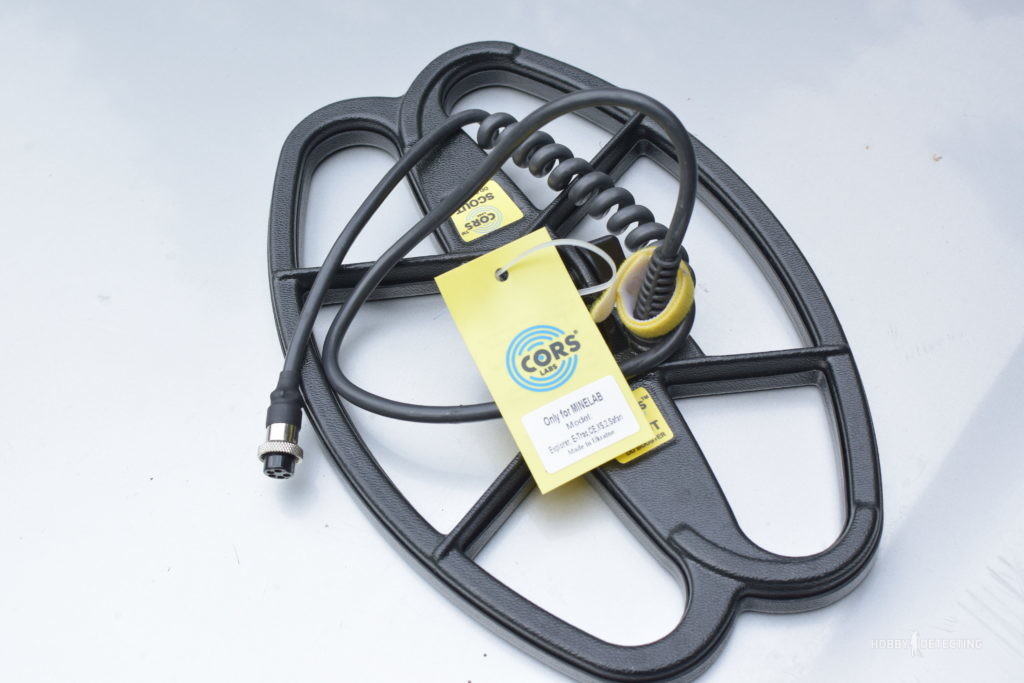
The reel came in a yellow box and saw the light exactly in this form — with a label where the model/brand is written and for what series of metal detectors is it intended for? Also, despite the fact that in «Tractor» the wire was hidden inside the rod, this reel had Velcro to attach the wire to the rod. Standard equipment, Velcro will come in handy around the house!

Also included was a bolt and seals for the ears of the coil and the metal detector rod. In short, the kit consists of only the most necessary things.
The reel weighs 490 grams and after installation it does not seem heavy or weighs down the structure at all. The coil size is 12.5″x8.5″, which is slightly larger than the standard (per inch), but more compact in width.
I would love to use such a reel on my old ICQ, but since ICQ was sold long ago and was replaced by more professional models, we have high expectations for this reel — after all, the MineLab E-Track is a deep device, and the DD Booster promised by the manufacturer should give, albeit a small, but increase in depth, which is what we need in places where it is impossible to place a large-size coil due to the presence of a large amount of metal debris, among which it is necessary to pick out any a more or less positive signal similar to the treasured coins that we are looking for.
Field exit with Cors Scout on a knocked-out field
Содержание статьи:
— You won’t find anything there, the field has been cleared out for 25 years, there’s no point in going there anymore. Hundreds of search engines have been there, and you will only be wasting your time. (c)
I would even write the name of who said it, but I won’t. 🙂 I don’t believe in knocked out places, because what has been lost for millennia cannot be found in a couple of decades.
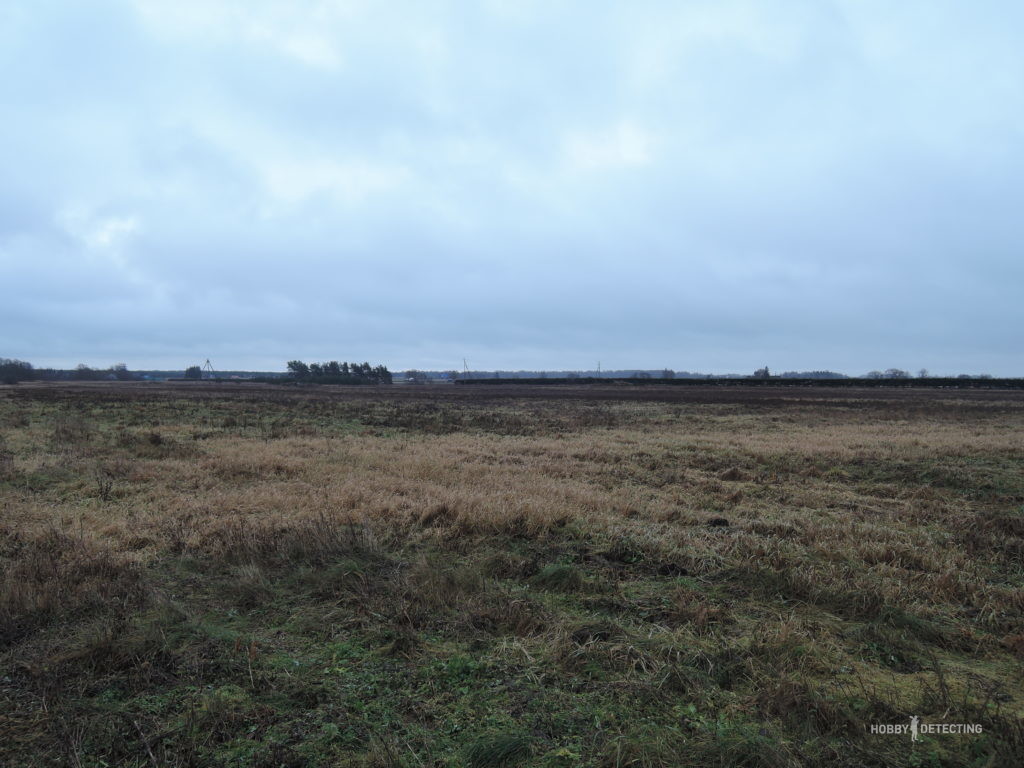
Here is the field itself. Quite large and ancient, life has been glimmering here for more than 2000 years, and not far from this place there are places forbidden for digging, where ancient fields and settlements with burial grounds were found — everything dates back to the Iron Age, which is almost 3000 years ago! How can such a field be empty? Of course not, and there must be something there! With these thoughts, I unsheathed my metal detector and installed the coil.

The reel in the Tractor must be placed in a special way — the wire is quite bulky and to thread it you need to take a small nylon thread and tie it around the coil plug, thread it through the rod and only then pull and thread the entire wire inside the rod. Just don’t even try to do it with your hands — will not work. We’ve already tried it ourselves.
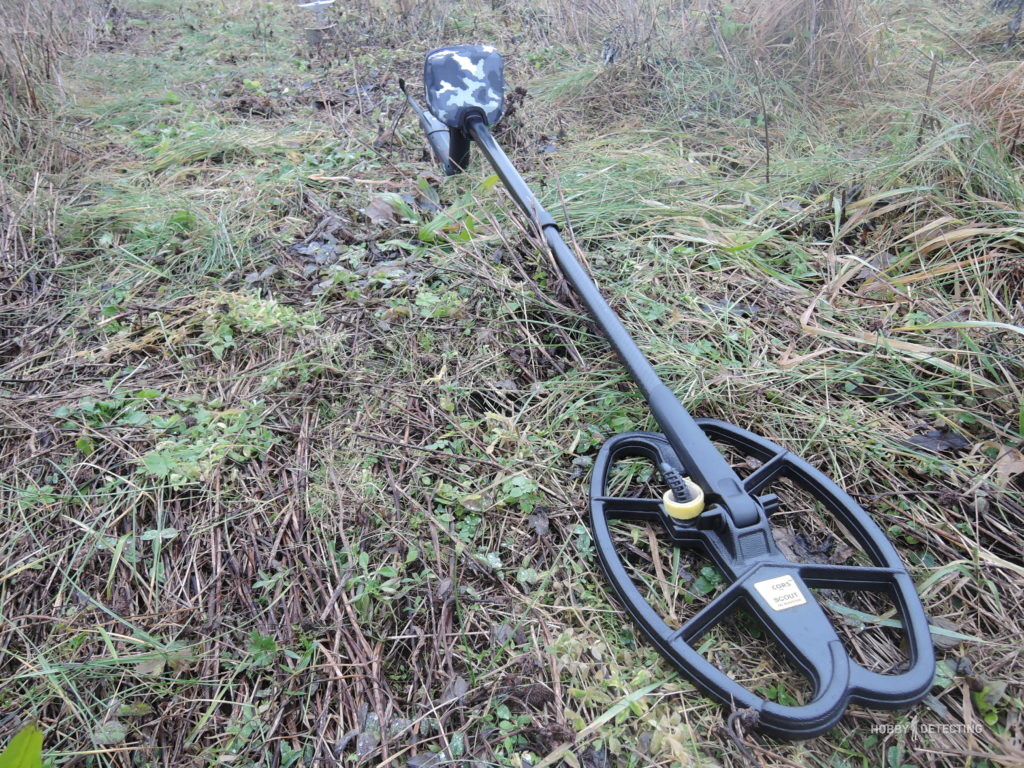
The bolt and seals securely hold the reel ears and prevent the reel from freely playing in any direction. But the main thing here is to know when to stop and not pinch your ears.

The ears are strong and will not break, because if you look at the entire structure of the ears, you don’t have to worry about their safety.
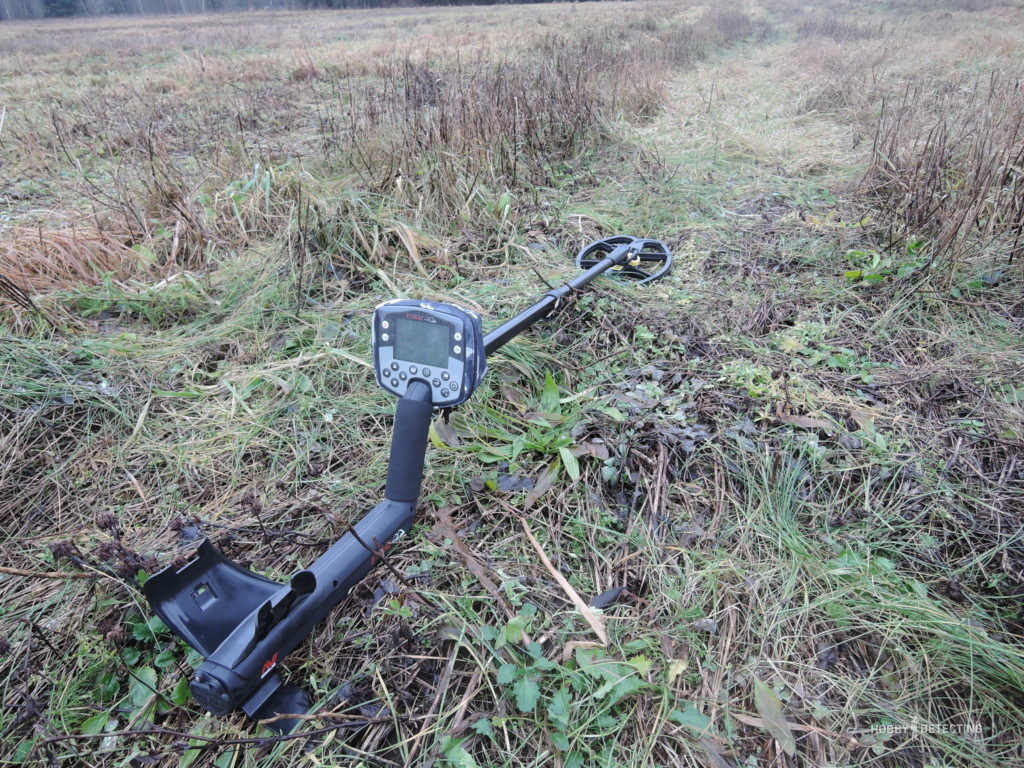
However, it’s time to go on the road and check the reel in a completely knocked out place.
The first hour and a half surprised me — Only garbage signals and objects made of black metal. The Tractor saw excellent deep signals and discriminated well, because several objects I dug up for testing with a stable VDI indicator (in the Tractor this is a double Fe-Co number) really turned out to be various kinds of objects made of ferrous metal that were of no interest. Unfortunately, I worked without ears, but the volume was turned up to maximum. Also, the device was configured specifically for slow and quiet work in depth, and everything that other diggers had not lifted before me climbed from the depths — some parts of equipment, forged nails, rusty junk, but I dug all this precisely to check, to know that the discriminator on the Tractor is not mistaken and correctly identifies objects.
Suddenly, among the periodic quacking, a higher-pitched sound was heard, but it was quite quiet that I checked it two or three times and only after that I saw the value on the screen. Well, it looks like a small coin, you have to dig. Naturally, I was happy, because it wouldn’t have — I’ve been walking for an hour and a half already and digging shmurdyak, but the target turned out to be really small, because the dug hole and the device shows that the find is still in the hole and needs to be dug a little.
I lifted more soil from the center of the hole, ran the coil — the target is in the dump, which means the pinpointer comes into play. A little witchcraft with a pin and the find is born, just as I thought — it’s a small coin!

I rubbed it a little and a year appeared. Well, our first find was 1 kopeck from 1953. The year of Stalin’s death is why the year of the discovery is so easily remembered. Well, the knocked-out field is not that knocked out and there may still be ancient finds there, which means we need to continue the search.
After the penny, I wandered for another hour and only pulled out iron and shmurdyak. There were no colorful or interesting signals from the word at all — This is what it means that diggers have been roaming this field for more than 20 years and, it seems, they will be walking for many more decades in the future, fortunately the field is near the city, the roads are close, it’s easy to drive through and dig.
But I came across a few more interesting signals, which I dug up in the hope of finding coins. But the finds turned out to be ordinary buttons, one of them had an interesting pattern and was clearly made at the turn of the mid-19th century. Where are the buttons — there are coins there, and the buttons on the embossed field are also a good find, you must agree?
I moved on and began to look for new signals. It began to rain, a cold and unpleasant rain, which began to darken the situation, but I decided not to give up and go to the last until I find the real antiquity. And I found it.
In the middle of the field I came across a good and interesting signal. It showed that it was quite possible that this was a coin, it was stable and very deep. I almost dug a pit, because I couldn’t get close to the small hole in depth. The scoop had already come to the rescue, with which I began to dig deeper, because I no longer wanted to dig out the target with a shovel, I was afraid of damaging it. In one hand there is a scoop, on your knees, in the other hand there is a pin — This is how we operate. And here it is, the find ended up in a plastic scoop (I recommend — the pin doesn’t foul!), we have to look at why we started all these excavations.
And he was born:
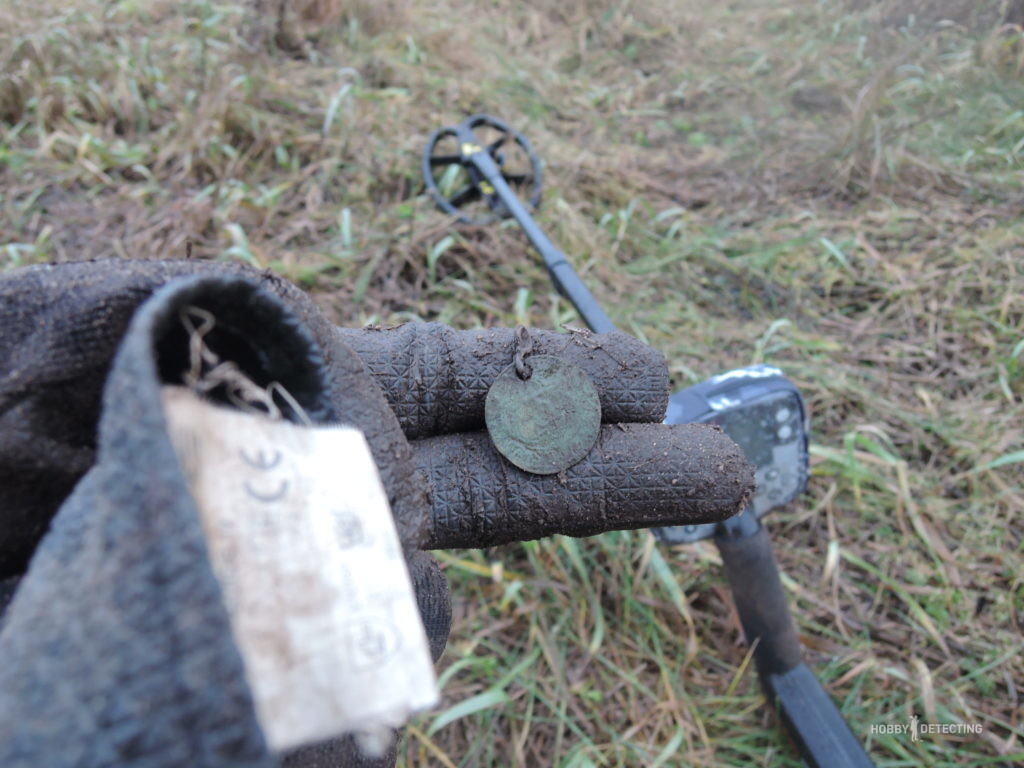
It’s a pity that it’s in the form of a pendant, but it turned out to be a Nuremberg counting token from the 16th century! Yes, such a thing, as it turned out later after identification, was minted in the mid-1550s, in Nuremberg, and some cheerful inscription was written in Old German, which has yet to be deciphered and translated.
Everything turned out to be not as sad as our fellow diggers thought. The field still contains antiquity and no matter how much you walk on it, there are still coins somewhere deep down. Then the rain became even heavier and turned into downpour, and therefore I had to pack up from the search and move to a warm and dry place, drink hot tea, and clean the device after the mess of earth and rain.
Result for the Cors Scout reel
Of course, Minelab E-Trac is a deep device. It may be slow, not very suitable for reconnaissance (here Deus or F75 is better), but with an amazingly working discriminator (you almost never make a mistake on an object, you dig a little) and a pinpoint (the most accurate I’ve ever seen). In combination with the Cors Scout reel, the result was a «knockout» for places where there is still enough iron in the ground, but where it is necessary to pick out potential and interesting objects among all this stuff. The field also turned out to be difficult in terms of soil, in some places the stones made it difficult to dig properly, but a Tractor with a Cors Scout reel and among such stones in the ground unearthed an old button. Cors Scout is also perfect for digging on the beach, for example, or in places where there used to be a village or settlement, but now there is a lot of garbage in the ground. The coil will provide both depth and sufficient coverage of the territory.
What can we say? Replacing the standard coil is very often necessary, and a coil such as the Cors Scout is perfect for replacing the standard coil on any metal detector, especially if you have an inexpensive metal detector, but not enough for a more expensive model budget, then you can take a coil that will give your metal detector a second wind and, albeit a little, additional depth and sensitivity to targets.

Now, while it’s winter and all the fields are covered with a meter of snow, I have no choice but to look at these photos and clean up the finds, and think about when I’ll return to that field again in the spring, to the place where I picked up the old counting token and checked what was still left in the ground, I feel that there are definitely still coins there!
No worries, friends!
